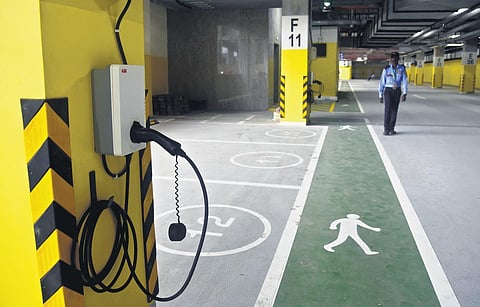

CHENNAI: Road transportation and railways contribute 16% of Chennai’s total greenhouse gas emissions, says a draft report of the Chennai Climate Action Plan prepared by Greater Chennai Corporation. As an alternative, the report suggests use of more electric vehicles to cut emissions.
According to a Deloitte report, e-vehicle conversion can be promoted through retrofitting of existing vehicles. While retrofit kits for autos can help achieve electrification goals, battery standardisation with retrofit kits can help push battery swap infrastructure as well. These changes will increase demand and make the public more open to adopting electric vehicles.
To make the transition to e-vehicles, the city requires infrastructure, including charging systems, which could be promoted by amending building regulations. The corporation report also suggests that the city can play a supporting role in raising funds for charging infrastructure and will require direct grants from the state government and changes to building regulations to allot land for charging stations.
The TN government released a revised e-vehicle policy in February 2023 with the aim to attract investments worth Rs 50,000 crore in electric vehicle manufacturing and create 1.5 lakh jobs over the next five years. The policy offers incentives and declares that the state will amend Tamil Nadu Combined Development and Building Rules, in line with the Model Building Bylaws 2016, for creating electric vehicle charging infrastructure.
Despite incentives, domestic production of lithium-ion batteries for electric vehicles has not picked up pace. Companies like Ola Electric Mobility are venturing abroad and tapping markets in Australia.
The corporation draft report calls for an EV roadmap on the manufacturing of vehicles, the demand-side incentive for households and businesses purchasing electric vehicles, and input from planning bodies to incentivise e-vehicles through parking regulation and enabling infrastructure.
The report states that the perception of e-vehicles being unreliable and difficult to charge is likely to discourage adoption, and households at the middle-income level or below do not have formal and reliable parking spaces.
The city needs enabling legislation at the state level to solicit and support private investments in creating charging infrastructure. The Deloitte Knowledge Paper on ‘Accelerating Tamil Nadu’s Progress to Becoming a One Trillion Dollar Economy by 2030-31’ has suggested that the state can provide government-backed financial assistance for auto drivers to acquire and operate electric vehicles via usage-based payment plans, incentivize private owners by offering public charging infrastructures and battery swap stations, and subsidize the cost of electric vehicles via rebates on the state goods and
services tax.
On the road